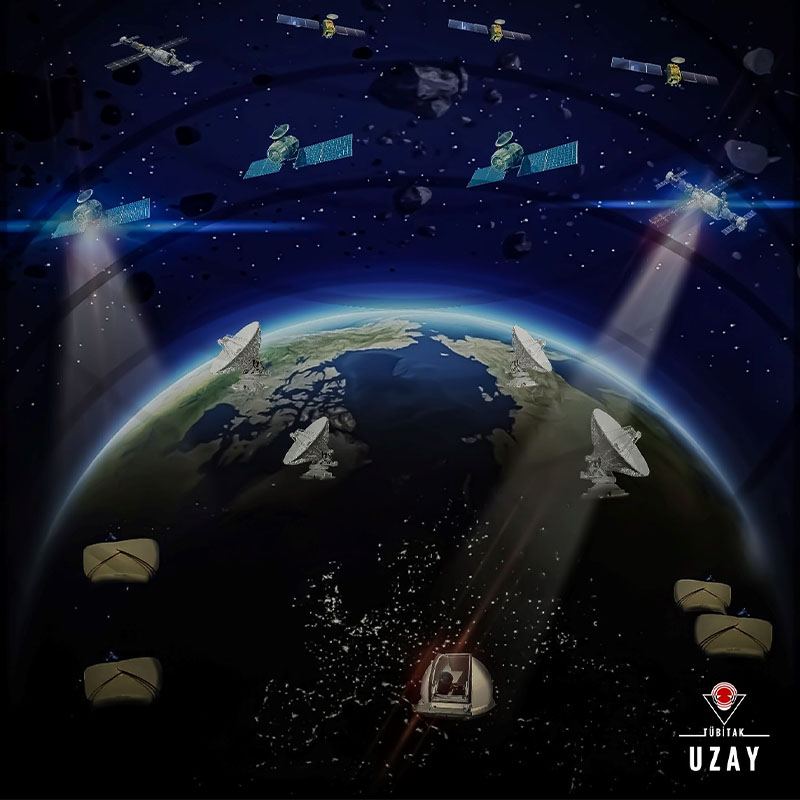UZAY
Leading Solutions in Space Situation Awareness
Leading Solutions in Space Situation Awareness
(Satellite Management Equipment)
TÜBİTAK UZAY offers pioneering solutions in the field of Space Situation Awareness (SSA) by demonstrating a comprehensive competence in various space projects. SSA system engineering provides tracking and management of space objects, while astrodynamic analyses perform trajectory calculations and maneuver planning. Mission planning services and mission simulations are used to effectively manage space missions.
Expertise in the design, selection and integration of passive and active sensors enables the optimization of various spacecraft and systems. There are also capabilities to develop robotic systems for automation and precision operations in space missions. Data processing technologies are used to analyze and interpret data obtained from space.
Big data, database and user interface management enable the processing of large amounts of data in space projects and the development of interfaces that meet the needs of users.
Space Situation Awareness (SSA) is of utmost importance in today's space exploration and operations. TÜBİTAK UZAY offers a wide range of services to increase the efficiency and safety of space operations:
- Observation and tracking of space objects with various sensors
- Data processing, segregation, and filtering
- Data fusion
- Detection and association of space objects
- Orbit determination and pptimization of space objects
- Mission planning and analysis
- Maneuver detection, collision warning
- Launch and atmospheric re-entry monitoring
- Characterization of space objects
- Satellite and space debris catalog
- Big data management

SSA Features
Key Features
Celestial Observation and Tracking with Different Sensors
Various systems are used to accurately and continuously observe celestial bodies. These sensors enable the real-time tracking of satellites and space debris in Earth's orbit.
Data Processing, Segregation, and Filtering
To extract useful information from the obtained data, processing, segregating, and filtering are necessary. Advanced algorithms and artificial intelligence technologies examine extensive data sets, eliminating irrelevant data and emphasizing crucial details.
Data Fusion
Compiling information gathered from many sources helps us comprehend situational awareness in space better. Data fusion technology combines information from multiple sensors to get outcomes that are more precise and trustworthy. This technique is used to track and comprehend space occurrences more effectively.
Detection and Association of Space Objects
Identification and tracking of objects in orbit are critical tasks. Advanced detection and associating algorithms accurately track and identify space objects. This guarantees more efficient control of space-operating satellites and other objects.
Orbit Determination and Optimization of Space Objects
The orbits of space objects must be precisely determined and, if required, optimized in order to reduction of collision risks and organize missions. Orbit determination and optimization are carried out by continuously updating and analyzing existing orbit data.
Mission Planning and Analysis
Space mission planning and analysis are important to the success of operations. The best possible management of missions and spacecraft is ensured by mission planning services.
Maneuver Detection and Collision Warning
By detecting maneuvers and averting any collisions, spacecraft safety can be guaranteed. Collision warning systems detect potential hazards, enabling quick responses.
Launch and Atmospheric Re-entry Monitoring
Thorough observation of spacecraft launch and atmospheric re-entry procedures is essential for successful operations. Managing operations requires precise control over these activities.
Characterization of Space Objects
The physical and chemical properties of space objects provide valuable information for space research. Understanding the structures and behaviors of different celestial bodies is the result of characterization studies.
Satellite and Space Debris Catalog
Keeping track of all operational satellites and space debris is essential for managing space traffic. All space objects can be managed and monitored thanks to cataloging efforts.
Big Data Management
Large amounts of data collected from space must be managed effectively. Big data management systems optimize data processing, analysis, and storage while giving consumers quick response.

